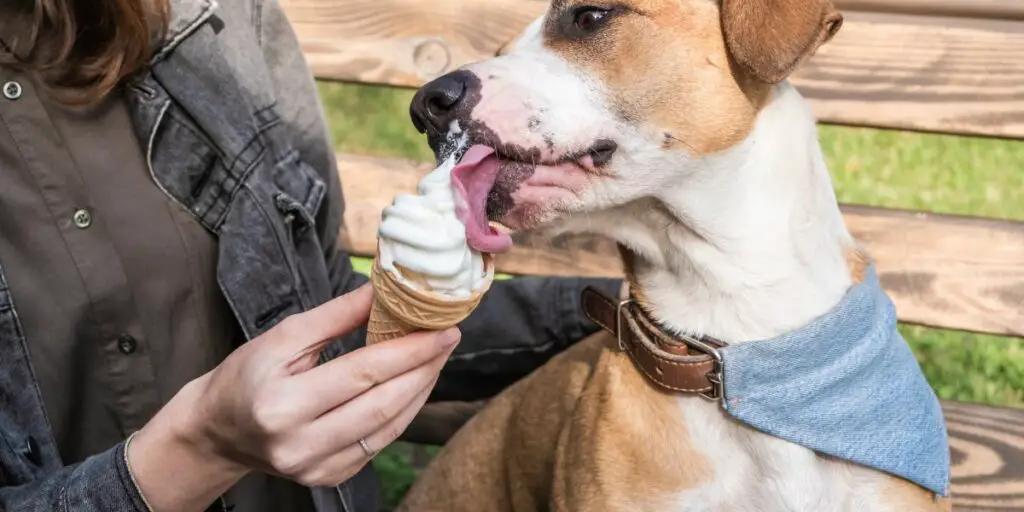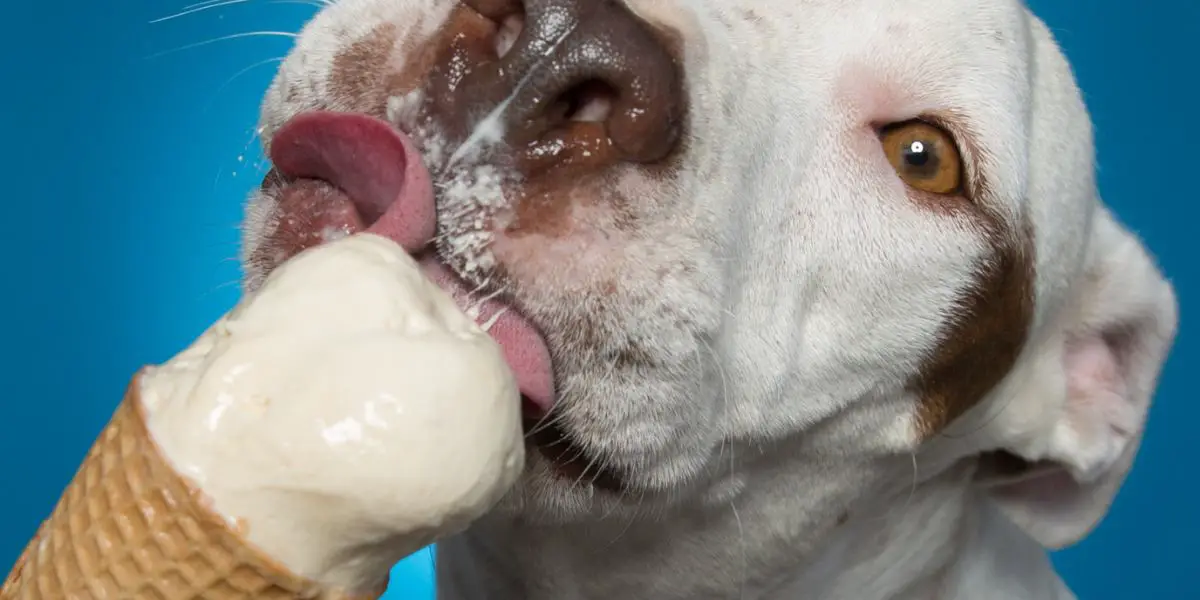Almost everyone enjoys eating ice cream. What could be better than a cold, sweet treat on a hot day? You might wonder if it’s safe to buy your dog a popsicle the next time you go to the local creamery. To put it another way, is it safe for your dog to consume ice cream?
Do you have a specific question dogs eating ice cream? Then use the table of contents below to jump to the most relevant section. And you can always go back by clicking on the black arrow in the right bottom corner of the page. Also, please note that some of the links in this article may be affiliate links. For more details, check the Disclosure section at the bottom of the page.
Here's what we'll cover:
Why Do Dogs Love Ice Cream?
Consider why you adore ice cream to understand why dogs go crazy about it. It’s creamy and sweet, and it’s heavy in fat, like many of the high-value foods people and hounds enjoy. For the same reasons we do, dogs tend to go crazy over meals and treats we want, such as cheese. They taste great! However, they are rarely healthy for us and nearly never excellent for your dog.
Can You Give Your Dog Ice Cream?
The simplest and most direct response is that dogs cannot eat ice cream. This is because there are numerous precautions and ingredients to be aware of if you wish to serve your dog’s ice cream properly.
At the same time, some dogs can eat a small amount of ice cream without incident, and a few licks will be plenty for most healthy dogs. However, ice cream should only be had on rare occasions and should only be vanilla.
So, technically, dogs can consume ice cream. Still, according to Dr. Williams, traditional ice cream (the human variety) is not beneficial for dogs. This is because pups have an enzyme that allows them to digest their mother’s milk while breastfeeding. Unfortunately, there is less enzyme when puppies are weaned, making it more difficult for dogs to digest dairy. And no one wants a puppy who has a stomach ache.
Traditional dairy-based ice cream is high in fat and sugar, which can contribute to weight gain and obesity in dogs and the risk of digestive disorders. Overweight dogs are more likely to acquire a variety of ailments, including diabetes, heart disease, and hypertension, so calories count! Switching to sugar-free ice cream is also not viable because certain sugar-free ice creams may include xylitol, a poisonous sweetener to puppies.
It may be tempting to feed your dog a cone of ice cream on a hot summer day, but instead, try dog-friendly ice cream. This dog-friendly alternative to human ice cream has the same cool, creamy appeal as human ice cream. They’ll enjoy having such a tasty (and completely safe) treat!
Common Reasons Why Dogs Can’t Eat Ice Cream

The issue with ice cream is that it is high in sugar and lactose. It may also contain sugars, chemicals, and flavors toxic to dogs, such as chocolate or xylitol. So, why is ice cream so unpredictable for dogs?
Way Too Much Sugar
Sugar is by far the most problematic aspect of ice cream. Dogs are not evolved to digest sugar effectively. Still, they are also smaller than humans and can tolerate less before becoming ill. Suppose your dog consumes too much sugar or consumes sugar frequently. In that case, it can result in poor oral health, obesity, and even diabetes. These problems can make your dog more vulnerable to other illnesses like cancer.
Furthermore, a lot of sugar will most likely make your dog hyperactive. Furthermore, the high-fat content of some ice creams may pose a risk to dogs suffering from pancreatitis.
Even vanilla ice cream, generally safer for dogs, is high in sugar.
For example, brand of vanilla ice cream contains 32g of sugar per serving and 11g of fat, for a total of 260 calories per serving.
Your dog should not consume a human-sized dish because it will consume far too many calories for the day. An entire scoop of ice cream for your dog would be equivalent to you eating cheeseburgers for every meal for a day. It won’t kill them, but it should never happen.
Suppose your dog already has a problem such as diabetes or pancreatitis. In that case, they should avoid eating ice cream because it will most likely harm their health.
Lactose intolerance in your dog
Your dog requires digestive enzymes to breakdown food. They help your dog’s body absorb nutrients by breaking down the meal.
Because ice cream is made from dairy, it contains lactose (a milk sugar).
Lactase, a digestive enzyme, is required by your dog to break down lactose into simple carbohydrates.
Lactase is produced by dogs. However, like with some humans, it is not always sufficient to digest lactose. And this can lead to intolerance, which causes stomach distress and symptoms such as
If this is your dog’s first time eating dairy or ice cream, start slowly to see how his body reacts.
Sugar-Free Is Not The Answer

Unfortunately, removing the sugar is unlikely to make the ice cream much healthier for your dog. In fact, the regularly used sweetener xylitol is particularly poisonous to dogs, making it a riskier option. In addition, many human foods contain xylitol, including various types of ice cream. Not only that, but it may be present in the ice cream’s ingredients or flavors, such as peanut butter.
Dangerous Ingredients in Ice Cream
Some ice cream varieties are extremely toxic to your dog, particularly chocolate ice cream or items containing chocolate chunks. If your dog consumes a dangerous amount of chocolate, this could result in
Chocolate, however, is not the only flavor that might make your dog sick.
Caffeine is present in coffee-flavored ice cream. However, too much coffee can also cause symptoms such as chocolate poisoning, seizure, or collapse.
The hazards increase when there are entire coffee beans in the ice cream.
It would help if you also kept an eye out for items that include specific nuts (such as macadamia) or raisins. They are also poisonous to dogs.
How to Serve Ice Cream to Your Dog Safely?
If you do decide to feed your dog ice cream, stick to fruit flavors or simple vanilla. Feed tiny amounts at initially to ensure that your dog’s tummy is not irritated. If your dog’s stomach doesn’t agree with the dairy, you’ll probably notice symptoms like bloating, gas, vomiting, gastrointestinal upset, and diarrhea within two hours.

If you want to give your dog a cool treat to try this summer, consider making homemade ice cream for him. Pureeing bananas, peanut butter, and a touch of yogurt (which contains less lactose than ice cream) yields a delectable delicacy that can be frozen at home. You can also include oats, apples, or other dog-friendly items.
Vegan ice cream and frozen yogurt may also be better for your dog because they contain less sugar and are lower in (or free of) dairy. Begin by giving your pooch a small amount, as with any rich new treat. Before giving her more food, wait a few hours to observe how she reacts to it.
What Should You Do If Your Dog Eats Ice Cream on Its Own?
Stay cool if your dog ate ice cream without your consent. Determine the flavor of the ice cream and how much your dog ate. If your dog did not consume any harmful components, they should be fine. They might be gassy or need to go pee a couple times more, so you might want to spend the day with them in the yard.
However, if your dog ate ice cream with artificial sweeteners, macadamia nuts, coffee, chocolate, grapes, or raisins, you could be dealing with a major scenario. Animal poison control can advise you on what to do next. Having said that, don’t put off going to the vet. Allow someone else to drive while you phone poison control, or vice versa.
The basic line is that ice cream isn’t a nice treat for dogs in general. Instead, make a delightful frozen dessert out of peanut butter, banana, and yogurt mash. There are simply too many potentially hazardous elements in dog ice cream.
Thanks for the blog graphics: Canva.com

Thanks for the blog graphics: Canva.com
Doghint.com is a participant of several affiliate programs. The list includes (but not limited to) the following: VigLink, Refersion, ShareASale, and Amazon Services LLC Associates Program, an affiliate advertising program designed to provide a mean for us to earn fees by linking to Amazon.com and affiliated sites. Doghint.com does not intend to provide veterinary advice. All published articles are meant for informational purposes only and not substitute the professional veterinary consultation.


